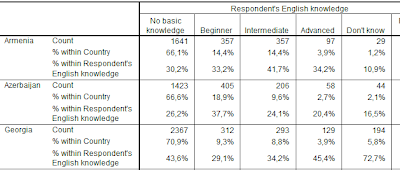Recently, we happened upon an article that talks about the use of Russian across the Caucasus. Is Russian becoming obsolete? According to the article, some Georgian politicians suggest this is the case. At the same time, the article points out that the uptake of English is too slow to replace Russian as a lingua franca.
As usual, we were a little disappointed that the article relied on many assertions, without actually checking for data. As it happens, the Data Initiative provides some insights on the question.
With English-language use, this is what respondents told us about their language ability:
One of the explanations for the different levels may be that diaspora contacts have traditionally brought more English to Armenia. Conversely, economic growth in Baku has attracted people more recently to begin learning English (as you will notice in many hotels and restaurants).
But then, where do people see language going in the next few years? Interestingly, there’s overwhelming approval for English as the first mandatory foreign language in secondary schools. Almost 70% in Azerbaijan and Georgia would prefer English, with 57% favoring English in Armenia. In Armenia, 37% suggest Russian should be mandatory in secondary schools. Only 27% of Georgians, and, surprisingly, only 18% Azerbaijani respondents prefer Russian. In Azerbaijan, 9% think that no foreign language should be mandatory, while 4% suggest that Turkish should be the first foreign language.
It is at this point, that we’re curious to explore how the respondents break down into different groups. When looking at the data, Nana stumbled upon an interesting dimension: the more intelligent the respondent is rated to be (by the interviewer, and it’s a very crude measure, but returns interesting results), the more they favor English.
Want to know more? Compare women and men? The old and the young? Citydwellers’ English versus rural folk? Let us know, or, better, explore the data set yourself.











